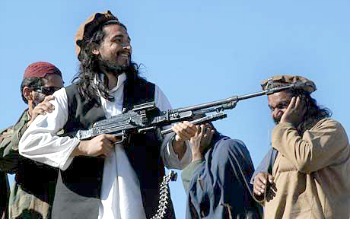Archives
AND MORE...

From The Mouths Of Historians
_____________________

Another Lie In The Life Of The Presidency
_____________________

Don't Know Much About Much
_____________________

Incentivizing Killers
_____________________
October 8, 2012
The Side That Isn't & Doesn't
We have consistently maintained there are two sides to the national security debate, i.e., the smart side and the not-so-smart side, or in more politically-correct terms, the knowledgeable and informed side that makes sense, and the side that ISN’T and DOESN’T.
We focus on the former, but in an effort to be fair and balanced occasionally bring examples of the latter.

Accordingly, for those who lean towards the latter, we highly recommend the editorial in Friday's New York Times, entitled “Peace Talks With the Taliban.”
For those who lean towards the former, here are a couple of reasons the Times editorial is of the latter.
“American military commanders long ago concluded that the Afghan war could only end in a negotiated settlement with the Taliban, not a military victory,” says the Times.
Nice, except history has repeatedly shown negotiated settlements like the one contemplated here, work only after a clear military victory has been achieved and the enemy has been DEFEATED.
[Unfortunately, history has never been a strength of the Obama administration. In fact, it's been said “Obama is a classic example of a shrewd but poorly educated political impostor who has managed to achieve immense power - not very different, except in the outer gloss, from, say, Venezuela's Hugo Chavez.” Nevertheless, while historians have been writing about Mr. Obama's astounding lack of historical knowledge (see “Attack of the Historians”), he has managed to craft so-called foreign policy around it, further proof of the old adage 'public ignorance is the government's best friend.']
The Times continues: “But now the generals and civilian officials say even this hope is unrealistic before 2015 — after American and coalition troops are withdrawn. They are, instead, trying to set the stage for eventual peace talks between the Afghan government and the insurgency sometime after their departure.”
Which begs the question: If a negotiated settlement is “unrealistic” when coalition troops are in Afghanistan, what would make it realistic after they leave Afghanistan? Simply put, what incentive would the Taliban have after American and coalition troops are withdrawn (or in their eyes, defeated) to agree to any kind of settlement?!
Log In »
Notable Quotables
"Mr. Netanyahu is one of the most media-savvy politicians on the planet. On Friday he appeared live via video link on 'Real Time with Bill Maher,' taking the host’s alternately sardonic and serious line of questioning with gazelle-like alacrity."
~ Anthony Grant, jourrnalist who has written for many major newspapers and worked in television at Paris and Tel Aviv, interviewing former PM Benjamin Netanyahu on Monday, at the outset of Mr. Netanyahu's new book (more here).
And Then Some
Dangling Israel
March 24, 2022
New Global Leaders
March 23, 2022
Ukraine Can Learn From Israel
January 31, 2022



